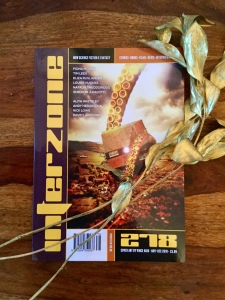Interzone #278

.
TTA PRESS 2018
My previous reviews of this publisher: https://dflewisreviews.wordpress.com/tta-press-interzone-black-static/
Fiction by Tim Lees, Fiona Moore, Louise Hughes, Eliza Ruslander, Sheldon J. Pacotti, Natalia Theodoridou.
Much SF non-fiction material is also in this magazine. When I read the fiction, my thoughts on it will appear in the comment stream below…

“And these machines, these huge machines, they pull themselves apart, re-make themselves, change shape, over and over.”
But their essence, where or what or who is that? A story of a man or machine who is not brainwashed exactly but has an observable self fitted who is that man as man or machine, but which is which, and who knows whom? A way to get soldiers to fight the wars that need to be fought, against others, even against themselves, sometimes on different sides with abnormal relativities of physical scale when in man-to-man-to-machine combat. A bit like gestalt real-time reviewing when such reviewing risks becoming a form of brainstorming rather than a retelling or evaluation of it straight. Like describing it with compelling passion to a cabdriver who does not know where you – or your brother – lives when on leave or invalided out. And thus I hope to accomplish for all works reviewed what it says at the end of this particular intriguing work about putting ‘broken pieces’ back together again so they can work again. And again?
My previous reviews of this author: https://dflewisreviews.wordpress.com/tag/tim-lees/
“…however satisfying the squish, it wasn’t exactly good for the car to drive directly into an ant.”
Nor even obliquely! And this is an intriguingly and frighteningly oblique fable upon an alternate world that, due to the accretion of clues, we eventually recognise as ours, given the madness of a nation world called Xenophobia First! My words, not the story’s. None of us belong here. Except for them! “…in a frustrating catch-22 system of paranoia,…” as we recognise the students, we recognise the neighbourhood of moving fashions and people.
“I whispered my rhymes to the rocks. They were a rapt audience. Sometimes they clatter clapped.”
Some nice lines from a storyteller-with-invisible-rhymes as narrator with various audiences, such as the lines quoted above and below, including the bit about slaying a reviewer, if I recall correctly! I hesitate to evaluate the plot of this prose, a prose that was experienced as wittily wistful and musical poetry for its own sake without obvious meaning but with an osmotic soul of story, because that is how I remember reading it. Or how it now begins to read me, just one of its audiences.
“They didn’t want hope. Not really in their deepest, chillest hearts.
They only thought they did.”
An awl also sounds like a preternatural Gestalt, and this magazine’s second consecutive story — imparting osmotic prosetry as part of its message and plot — apotheosises the aggregate nature of identity (witty, evocatively tactile and down to earth, too), and accidentally re-summons the machine/ man methods of identity-planting for specific purposes in the earlier Tim Lees story, here with a man and a car, and the widow who uses both him and it in holistic tandem as a surrogate of her beloved dead husband. With awl that that entails.
“So many filers of paperwork out there, doing everything right but not finding anyone to pay them…”
Fliers of paperwork, too, a descript for Interzone paper, planes crashing in slow Zeno’s Paradox motion, with a “rainbow of parachutes”, passengers dangling. This is POV of another Tim Lees type “soldier”, this time with a cyber brain making him work, although he has a self as a believable narrator with discrete yearnings to date the woman who ‘chooses’ to sit by him in a bus, as they watch such a plane veering… meanwhile, this is a core story as a prophecy (written before it happened) of today’s American shutdown or culminating ‘zero day’. Here of stock markets. If not drones at Gatwick? Part of the hacking wars in 2036 and social media infiltration in hotspots of night clubs neatly called Relik, as he homes nearer, again by Zeno’s Paradox, to the previous bus co-passenger and his own (triumphant?) destiny as ‘soldier’. Some beautiful images and words in this significant work. Its stars stab you in the eye.
“Who asks soldiers what they think?”
A fine, if accidental, coda to this set of fiction, a set dealing with hybrid soldiers (hybrid in various ways) and the morality of war, also in various ways, often involving love as well as violence. This one has the aura of earlier osmotic prosetry (its soldiers akin to the wood in Macbeth) interweaving a court case dialogue with the side comments of the woman being accused. Poignant coda, indeed. As well as a discrete work to cherish.
end of this magazine’s fiction